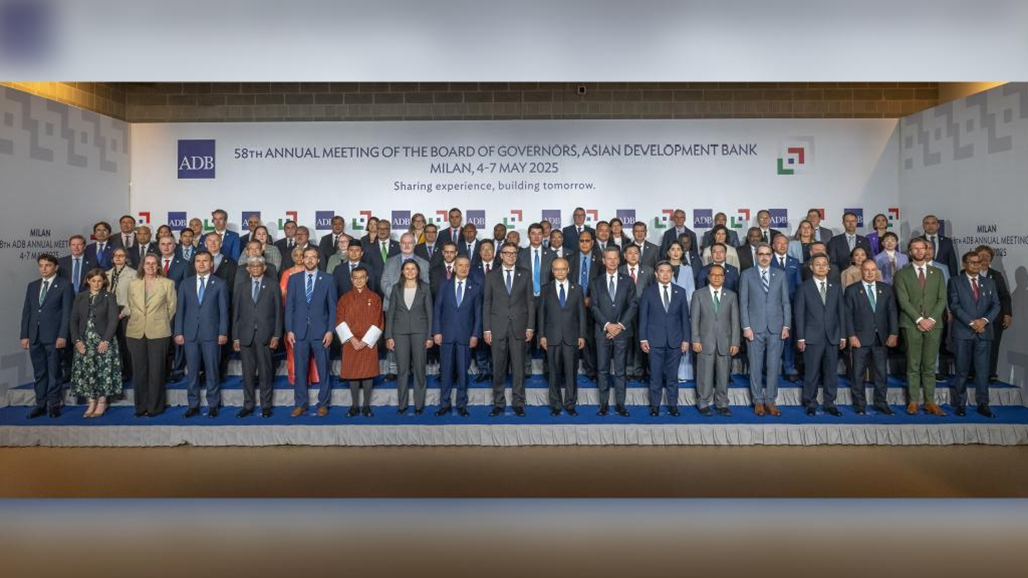(1) INTRODUCTION
ABA member bank representatives – as well as executives from the ABA Secretariat Deputy Secretary Mr. Amador Honrado Jr. and Senior Officer Ms. Teresa Liu – joined other delegates from private and public sector organizations at the 58th Annual Meeting of the Asian Development Bank (ADB) held in Milan, Italy on May 4-7, 2025, marking Italy’s first time to host and the first ADB Annual Meeting in Europe in almost a decade.
The ADB Annual Meeting is a key opportunity for ADB’s 68 members to consider development issues and challenges facing Asia and the Pacific. Several thousand participants, including finance ministers, central bank governors, senior government officials, members of the private sector, representatives of international organizations, civil society, and the media regularly join the meeting, which has become a premier forum for the discussion of economic and social development issues in Asia and the Pacific. During the past several years, the ADB has accredited the ABA as a Guest Association in the Annual Meetings of its Board of Governors.
More than 5,000 participants joined the Annual Meeting in Milan, Italy consisting of representatives of governments—including Italian Prime Minister Giorgia Meloni—the private
sector, civil society, and academia.
Held under the theme “Sharing Experience, Building Tomorrow”, this year’s Annual Meeting highlighted four focus areas that are central to driving transformational change across Asia and
the Pacific.
- To address the vulnerability of the region’s food systems, ADB will scale up financing for food systems transformation to $40 billion by 2030.
- ADB is investing in digital technologies to improve access to education, finance, and markets.
- ADB is investing in modernizing and connecting energy systems, including readiness to commit up to $10 billion to support work on the ASEAN Power Grid.
- ADB is deepening investments to build resilience by strengthening infrastructure, restoring and protecting ecosystems, and helping vulnerable communities adapt to the impacts of climate change.
- ADB also reaffirmed its commitment to scale up private sector development, aiming to increase private sector financing four-fold to $13 billion annually by 2030.
(2) MEETING HIGHLIGHTS
A. Opening Session
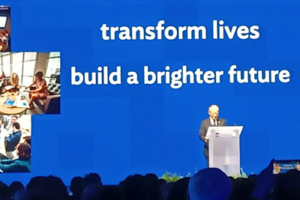 In his Remarks during the Opening Ceremony of the four-day event, ADB President Mr. Masato Kanda said that the uncertainties facing Asia and the Pacific are also an opportunity to build a more resilient and sustainable future. “External shocks, debt burdens, and climate change weigh heavily on the people and economies of the region. But we are not starting from zero. Growth remains solid, trade and economic integration are deepening, supply chains are diversifying, and digital connectivity and innovation are accelerating. Uncertainty is not a reason for retreat. It is a call to be bolder, to move faster, and to work more closely than ever before.”
In his Remarks during the Opening Ceremony of the four-day event, ADB President Mr. Masato Kanda said that the uncertainties facing Asia and the Pacific are also an opportunity to build a more resilient and sustainable future. “External shocks, debt burdens, and climate change weigh heavily on the people and economies of the region. But we are not starting from zero. Growth remains solid, trade and economic integration are deepening, supply chains are diversifying, and digital connectivity and innovation are accelerating. Uncertainty is not a reason for retreat. It is a call to be bolder, to move faster, and to work more closely than ever before.”
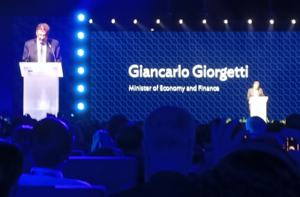 Italian Minister of Economy and Finance Giancarlo Giorgetti and Governor of the Bank of Italy and Chair of the ADB Board of Governors Fabio Panetta also spoke at the Opening Session, emphasizing Italy’s partnership with ADB. “Enhanced collaboration will support higher and sustainable long-term economic growth, avoiding the materialization of downside risks and mitigating their possible consequences,” said Mr. Giorgetti in his Remarks.
Italian Minister of Economy and Finance Giancarlo Giorgetti and Governor of the Bank of Italy and Chair of the ADB Board of Governors Fabio Panetta also spoke at the Opening Session, emphasizing Italy’s partnership with ADB. “Enhanced collaboration will support higher and sustainable long-term economic growth, avoiding the materialization of downside risks and mitigating their possible consequences,” said Mr. Giorgetti in his Remarks.
“As a leading multilateral bank and trusted partner in Asia and the Pacific, ASB has been working to solve complex challenges together with its members and partners, both regional and nonregional.”
B. Seminar Sessions
Mr. Honrado and Ms. Liu attended a number of concurrent seminars that were held during the course of the four-day event. These included the sessions focusing on the following topics:
Globalization as a Force for Sustainable Development
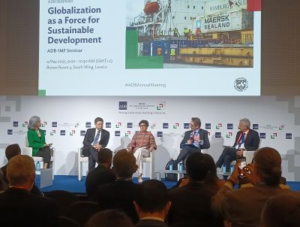 This seminar examined how globalization and multilateralism can be supported to promote sustainable development amid rising global fragmentation. Speakers discussed the roles of financial integration, technology transfer, and international cooperation. The focus was on strategies that ensure that globalization benefits everyone and adequately addresses challenges that require coordinated action. The session provided insights into moving forward collectively in the global economy.
This seminar examined how globalization and multilateralism can be supported to promote sustainable development amid rising global fragmentation. Speakers discussed the roles of financial integration, technology transfer, and international cooperation. The focus was on strategies that ensure that globalization benefits everyone and adequately addresses challenges that require coordinated action. The session provided insights into moving forward collectively in the global economy.
Navigating the Digital Leap: Reimaging Work for Sustainable Prosperity
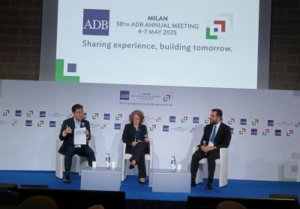 The panelists noted that digital technology increases productivity and creates new opportunities for employment. They discussed labor market and human capital adjustments needed for countries to boost productivity and achieve highincome status while ensuring environmental sustainability. The session highlighted the need for public investments and the importance of labor market adjustments, education sector reforms, upskilling and reskilling, and effective social protection systems.
The panelists noted that digital technology increases productivity and creates new opportunities for employment. They discussed labor market and human capital adjustments needed for countries to boost productivity and achieve highincome status while ensuring environmental sustainability. The session highlighted the need for public investments and the importance of labor market adjustments, education sector reforms, upskilling and reskilling, and effective social protection systems.
Unpacking the Risks in ADB’s Just Transition Agenda
Civil society stakeholders offered grassroots perspectives on the realities faced by vulnerable communities. The emphasis was on actions that avoid perpetuating inequities and undermining
efforts to build sustainable economies at the pace and scale necessary.
Beyond Borders: Building Bridges for Shared Prosperity
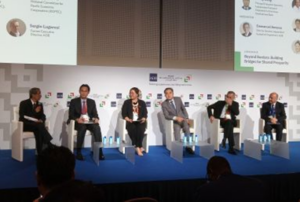 The panelists observed that Europe, having pioneered regional collaboration since the 1950s, has provides insights, particularly in areas such as public health, knowledge sharing, and the management of public goods. The seminar drew on recent evaluations by ADB’s Independent Evaluation Department and expert panelists explored how regional cooperation can enhance development and shared prosperity across the region.
The panelists observed that Europe, having pioneered regional collaboration since the 1950s, has provides insights, particularly in areas such as public health, knowledge sharing, and the management of public goods. The seminar drew on recent evaluations by ADB’s Independent Evaluation Department and expert panelists explored how regional cooperation can enhance development and shared prosperity across the region.
Heat-Proofing the Future: Solutions that Build Women’s Resilience to Extreme Heat
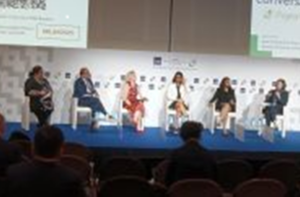 The panelists pointed out that as extreme heat intensifies, women and girls in communities across Asia and the Pacific face growing risks. The discussion spotlighted innovations that promote resilience. From heat-resilient infrastructure and eco-smart agriculture to early warning systems designed with women’s needs in mind, experts shared examples of initiatives that strengthen both individual and community resilience.
The panelists pointed out that as extreme heat intensifies, women and girls in communities across Asia and the Pacific face growing risks. The discussion spotlighted innovations that promote resilience. From heat-resilient infrastructure and eco-smart agriculture to early warning systems designed with women’s needs in mind, experts shared examples of initiatives that strengthen both individual and community resilience.
Sharing Experience, Building Tomorrow: A Conversation with President Kanda
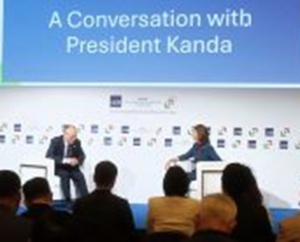 This one-on-one, in-person interview with the ADB President served as a curtain raiser for the 59th Annual Meeting. The President discussed his vision, priorities, and strategic direction for ADB amid the fast-changing global landscape. By offering insights into his leadership style and aspirations, it set the stage for broader discussions, providing stakeholders with a clearer understanding of the bank’s role in Asia and the Pacific, especially in solving complex challenges.
This one-on-one, in-person interview with the ADB President served as a curtain raiser for the 59th Annual Meeting. The President discussed his vision, priorities, and strategic direction for ADB amid the fast-changing global landscape. By offering insights into his leadership style and aspirations, it set the stage for broader discussions, providing stakeholders with a clearer understanding of the bank’s role in Asia and the Pacific, especially in solving complex challenges.
Transforming Accountability: Roadmap for a New Era
This session explored potential revisions to ADB’s Accountability Mechanism. Experts and diverse stakeholders discussed emerging trends that shape the future of accountability and project implementation.
An MDB’s Role in Developing Currency Markets
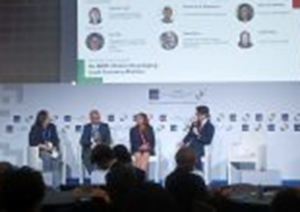 This session explored the importance of local currency market development, particularly in the context of increasing demands for sustainable financing, the different local currency funding mechanisms, as well as recent innovations in local currency markets and potential areas for improvement.
This session explored the importance of local currency market development, particularly in the context of increasing demands for sustainable financing, the different local currency funding mechanisms, as well as recent innovations in local currency markets and potential areas for improvement.
Upskilling for the Digital Age
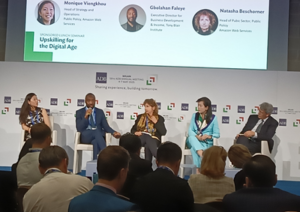 This session discussed innovative approaches for AI skill development, showcasing reskilling initiatives and the power of public-private collaborations. Panelists explored policy frameworks and investment models. Drawing from the ADB-AWS Digital Sandbox partnership, the session shared learnings on leveraging digital technologies to cultivate future-ready workforces. It also explored how these approaches can transform digital capabilities and drive economic growth.
This session discussed innovative approaches for AI skill development, showcasing reskilling initiatives and the power of public-private collaborations. Panelists explored policy frameworks and investment models. Drawing from the ADB-AWS Digital Sandbox partnership, the session shared learnings on leveraging digital technologies to cultivate future-ready workforces. It also explored how these approaches can transform digital capabilities and drive economic growth.
Powering the Future: Digital Pathways for Sustainable Energy
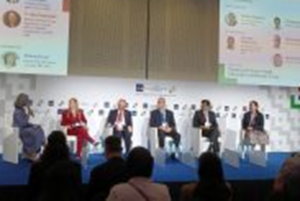 Experts discussed the latest digital technologies transforming energy systems. They explored how digital innovations and new technologies are reshaping sectors such as energy, industry, and transportation. Among the options discussed were offshore wind and energy-efficient appliances, alongside emerging ones like carbon capture, usage and storage, and renewable hydrogen. Speakers offered insights into collaborative efforts between governments and the private sector.
Experts discussed the latest digital technologies transforming energy systems. They explored how digital innovations and new technologies are reshaping sectors such as energy, industry, and transportation. Among the options discussed were offshore wind and energy-efficient appliances, alongside emerging ones like carbon capture, usage and storage, and renewable hydrogen. Speakers offered insights into collaborative efforts between governments and the private sector.
Dual Pathways to Economic Inclusion: Equipping Underrepresented Youth for Digital and Sustainable Future
Youth panelists discussed their lived experiences in navigating digital and ecological evolution. A live Mind Map tool was used to capture and synthesize critical insights during the discussion with
the audience. The aim was to present recommendations to policymakers on pathways to support underrepresented youth.
Digital Technology: A Lifeline to Building a Resilient Tomorrow
The session showcased civil society and private sector partnerships in using digital innovations to help protect the most vulnerable. It included speakers with experience on the ground who are
able to speak about the challenges in putting ideas into local action. The seminar shone a spotlight on the digital transformation aspiration of the Pacific Islands and discuss the potential
of digital innovations to build their resilience.
Investing in Next-Gen Skills for Jobs of the Future
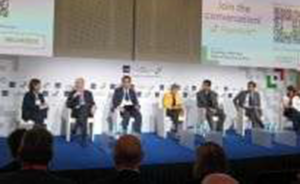 The seminar discussed investments needed in skills development to prepare for next-generation careers, modern workforce roles, emerging professions, and competitiveness. The speakers presented new approaches to training workers in educational institutions and on-the-job reskilling. Experiences from the EU and Asia were shared to highlight effective strategies for
The seminar discussed investments needed in skills development to prepare for next-generation careers, modern workforce roles, emerging professions, and competitiveness. The speakers presented new approaches to training workers in educational institutions and on-the-job reskilling. Experiences from the EU and Asia were shared to highlight effective strategies for
workforce development and to explore partnerships.
Asian Development Policy Report: Harnessing Digital Transformation for Good
Invited panelist noted that developing Asia is undergoing a rapid digital transformation, presenting opportunities to promote inclusive and sustainable development. However, they also stressed that if not well managed, it could exacerbate inequality and sustainability challenges. They pointed out that The Asian Development Policy Report 2025: Harnessing Digital Transformation for Good highlights key policies to harness digital transformation as a catalyst for accelerating inclusive and sustainable progress across the region.
Building Resilient, Low-Carbon, and Livable Cities through City-to-City Partnerships
This session launched ADB’s city-to-city partnership program, which leverages experience among partner cities with ADB financing to enhance infrastructure and service delivery improvement in
Asia and the Pacific developing member countries. Policymakers, private sectors, and city leaders come discussed challenges and share initiatives of leading cities in Asia and Europe, including
Milan, on disaster resilience, decarbonization, circular economy, and public-private partnerships.
Infrastructure in a Changing World: Financing Resilience in Infrastructure Strategies
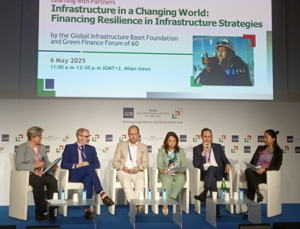 The session discussed the critical role of resilience in sustainable infrastructure development and its alignment with global goals. Panelists explored the FAST-Infra Label framework, as a practical tool for integrating resilience into infrastructure planning and design. They also identified innovative financing mechanisms for infrastructure projects, drawing upon case studies and best practices. Stakeholders from CSOs, government and private sector in attendance discussed how to enhance the resilience of infrastructure systems in a rapidly changing world.
The session discussed the critical role of resilience in sustainable infrastructure development and its alignment with global goals. Panelists explored the FAST-Infra Label framework, as a practical tool for integrating resilience into infrastructure planning and design. They also identified innovative financing mechanisms for infrastructure projects, drawing upon case studies and best practices. Stakeholders from CSOs, government and private sector in attendance discussed how to enhance the resilience of infrastructure systems in a rapidly changing world.
Enhancing ADB’s Strategy and Results to Drive Development Effectiveness
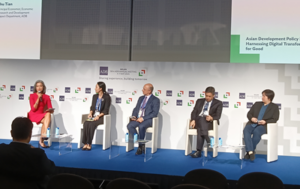 The session mentioned that in 2024, ADB undertook a midterm review (MTR) of Strategy 2030, identifying areas that require enhanced focus. ADB also introduced its new Corporate Results Framework, 2025-2030 (CRF), addressing strategic areas such as climate action, private sector development, digital transformation, regional cooperation and integration, and vulnerability and inclusion. The seminar engaged representatives from developing member countries, ADB partners, and staff to reflect on ADB’s development effectiveness, explore the implications of the MTR and new CRF’s strategic focus areas.
The session mentioned that in 2024, ADB undertook a midterm review (MTR) of Strategy 2030, identifying areas that require enhanced focus. ADB also introduced its new Corporate Results Framework, 2025-2030 (CRF), addressing strategic areas such as climate action, private sector development, digital transformation, regional cooperation and integration, and vulnerability and inclusion. The seminar engaged representatives from developing member countries, ADB partners, and staff to reflect on ADB’s development effectiveness, explore the implications of the MTR and new CRF’s strategic focus areas.
Strengthening Resilience through Ecosystem and Tech-based Approaches
This session explored how data-driven and digital innovations—such as artificial intelligence and the Internet of Things—can build resilience into global value chains and forge private and public
sector collaborations. From optimizing supply chains to enhancing early warning systems, advanced technologies enable organizations to mitigate environmental risks while uncovering new opportunities.
Innovative Finance for Asia’s Decarbonization
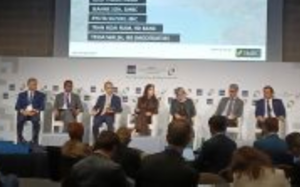 The session noted that as Asia’s emerging economies try to bridge an estimated $800 billion gap in annual funding for their net zero transitions, it is crucial to adopt market-friendly financing structures to attract private capital. But differing definitions and standards across jurisdictions present challenges. International Financing Review’s panel of experts discussed how governments, corporates and investors can come together to mobilize capital.
The session noted that as Asia’s emerging economies try to bridge an estimated $800 billion gap in annual funding for their net zero transitions, it is crucial to adopt market-friendly financing structures to attract private capital. But differing definitions and standards across jurisdictions present challenges. International Financing Review’s panel of experts discussed how governments, corporates and investors can come together to mobilize capital.
Protecting Workers’ Rights Towards a Just Transition
The session brought together trade unionists and ADB representatives to discuss and provide a clear understanding of how a just transition can be incorporated in the bank’s agenda. The panelists discussed the implications of global transformations on protecting human and workers' rights. They also looked at strategies to strengthen collaboration between ADB and trade unions to address these challenges and implement the new safeguards policy.
Cross-Border Collaboration for Future Resilience
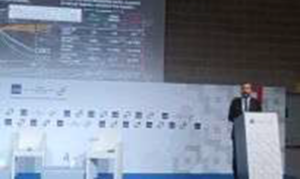 Invited speakers pointed out that Asia and the Pacific has been the main beneficiary of deepening global value chains by embracing open trade and investment regimes and strengthening international economic cooperation. They, however, also remarked that the international trade and investment environment face growing headwinds, including geopolitical tensions, rising protectionism, and risks of natural hazards, pandemics, and other shocks. They underscored that strengthening cross-border economic cooperation within the region and between Asia and Europe should underpin the joint collaborative efforts to safeguard economic resilience of the region by mitigating the negative impact of external shocks.
Invited speakers pointed out that Asia and the Pacific has been the main beneficiary of deepening global value chains by embracing open trade and investment regimes and strengthening international economic cooperation. They, however, also remarked that the international trade and investment environment face growing headwinds, including geopolitical tensions, rising protectionism, and risks of natural hazards, pandemics, and other shocks. They underscored that strengthening cross-border economic cooperation within the region and between Asia and Europe should underpin the joint collaborative efforts to safeguard economic resilience of the region by mitigating the negative impact of external shocks.
Engaging Stakeholders Meaningfully on Sustainable Development Projects: Lessons from Community Participatory Approaches
The session highlighted practical experiences of community participatory approaches and draw lessons from their application. Freshwater Action Network South Asia representative presented its Community-Based Participatory Monitoring approach, highlighting cases through its national chapters in seven South Asian countries. Partnership for Transparency representatives related their experiences in supporting grassroots civil society organizations in using social accountability tools.
Investing in Resilience: Unlocking Opportunities for Growth
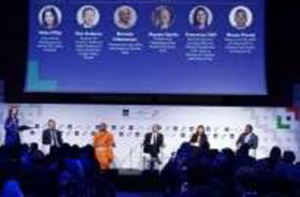 This seminar discussed how to address gaps in financing for resilience, including the integration of resilience planning into broader development and fiscal planning, strengthening the role of central ministries of planning and finance, and enhancing private sector engagement. Government representatives and technical experts discussed innovative approaches, share successful case studies, and explore how multilateral development banks can lead efforts to expand financing for resilience, in line with wider global processes related to COP, G20, and G7.
This seminar discussed how to address gaps in financing for resilience, including the integration of resilience planning into broader development and fiscal planning, strengthening the role of central ministries of planning and finance, and enhancing private sector engagement. Government representatives and technical experts discussed innovative approaches, share successful case studies, and explore how multilateral development banks can lead efforts to expand financing for resilience, in line with wider global processes related to COP, G20, and G7.
C. Side Activities
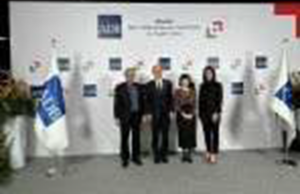 Mr. Honrado and Ms. Liu also managed to meet and say hello to ADB President Mr. Masato Kando and his wife during the ADB President’s Reception. They exchanged name cards with President Kando and briefly introduced ABA, its membership, its main objective, and its activities.
Mr. Honrado and Ms. Liu also managed to meet and say hello to ADB President Mr. Masato Kando and his wife during the ADB President’s Reception. They exchanged name cards with President Kando and briefly introduced ABA, its membership, its main objective, and its activities.
Mr. Honrado and Ms. Liu were also invited to attend the luncheon hosted by CTBC Bank for its associates and colleagues who participated in the ADB meeting. Hosted by CTBC Bank Vice Chairman Mr. Austin Chan, the luncheon was also graced by the presence of the ROC Taiwan Minister of Finance H.E. Chuang Tsuiyun and her colleagues, as well as representatives from a number of ABA member banks and the ADB.
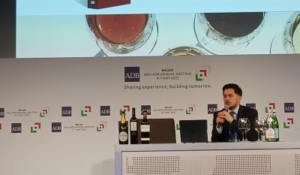 The ABA Secretariat executives also took the opportunity to join the Italian wine tasting session, a special side event organized by the host country aimed at promoting the Italian winemaking industry. During the session, the participants learned that the Italian wine industry is a global leader in both production and exports, with a history dating back thousands of years; that it boasts a vast array of indigenous grape varieties, diverse wine styles, and a highly structured system of quality control; and that Italy is the world's largest wine producer, exporting a significant portion of its output.
The ABA Secretariat executives also took the opportunity to join the Italian wine tasting session, a special side event organized by the host country aimed at promoting the Italian winemaking industry. During the session, the participants learned that the Italian wine industry is a global leader in both production and exports, with a history dating back thousands of years; that it boasts a vast array of indigenous grape varieties, diverse wine styles, and a highly structured system of quality control; and that Italy is the world's largest wine producer, exporting a significant portion of its output.

